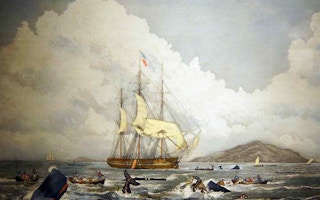People from all walks of life with an interest in climate change and Arctic marine mammals are working with maritime historians and scientists to examine records of polar weather.
The citizen scientists are helping the professionals to study the logbooks of 19th-century whaling ships in an attempt to gain a better understanding of modern-day climate change and weather patterns in the far north.
The project, led by the US National Oceanic and Atmospheric Administration (NOAA) was launched last month. It is anoffshoot of Old Weather, an ongoing partnership between NOAA and Zooniverse, a citizen science web portal.
Michael Dyer, a senior maritime historian at the New Bedford whaling museum in Massachusetts, which is supplying much of the data, said the whaling crews kept detailed daily logbooks of weather conditions during their voyages. The whaling museum is transcribing and digitising its own logbooks, as well as original data sources from other New England collections.
Weather conditions
Some logs include information about life on board – sailors falling overboard, for example, or being disciplined for stealing – as well as notes whenever whales are spotted. Significantly, they also record precise longitude and latitude measurements, weather conditions, the presence of icebergs, and the edge of the ice shelf.
“If they’re cruising in the Bering Strait and there’s ice, there will be a notation in the logbook that ice fields are present,” Dyer says.
The digitised logbooks are being posted online so that anyone interested can help researchers sift through the vast amounts of information, which are too much for the scientists to cope with on their own.
The museum has about 2,600 whaling logbooks dating from 1756 to 1965, but the project so far includes about 300 logbooks related to whaling trips to the Arctic from the mid-1800s to the first decade of the 20th century.
One entry from the San Francisco-based whaler Beluga during a voyage to the Bering, Chukchi and Beaufort Seas from 1897 to 1899 typifies the logs’ precise information.
It reads: “Lat. 61.19. Long. 175.42. Fast to the ice till 6 AM then made sail and worked to the NE at 8:45 AM. Commenced steaming. Steamed till 1 PM then struck open water. Carrying topsail and fore and aft sails. Steering from NNW to NE as the ice allowed. Wind light and variable first part. Latter part strong ESE winds thick and snowing. Ther. 30. Bar. 29.60.”
At its simplest, the information from an old logbook can be compared with current conditions – for example, to indicate if there is sea ice today in the places where whalers saw it 150 years ago.
But the project goes beyond that, says Kevin Wood, a climate scientist with NOAA’s Joint Institute for the Study of the Atmosphere and Ocean at the University of Washington and a lead researcher on the project.
Time-travelling
Recovering as much weather data as possible, he says, could help scientists to create sophisticated computer models of past climate and help to predict future conditions.
Wood calls the project a “virtual time-travelling weather satellite”. He says: “We can build an enormously detailed reconstruction of the conditions at the time… and we can understand how the climate has been changing over a longer period.”
High-resolution images of historical documents, extracted data and related research products are available online, says Michael Lapides, the museum’s director of digital initiatives.
The logbooks of more than 20 whalers are already online, and Lapides says the project is expected to last about a year.










